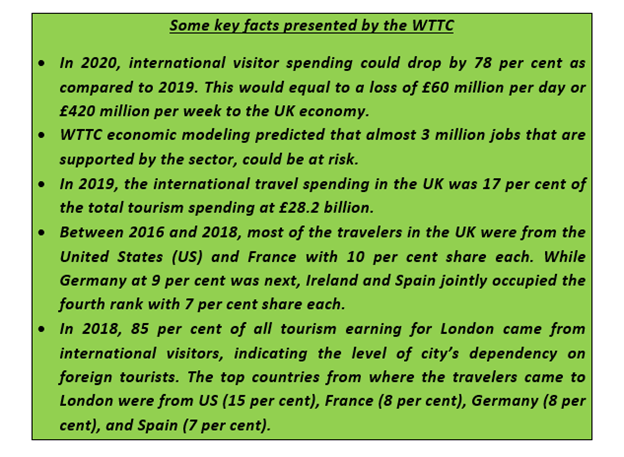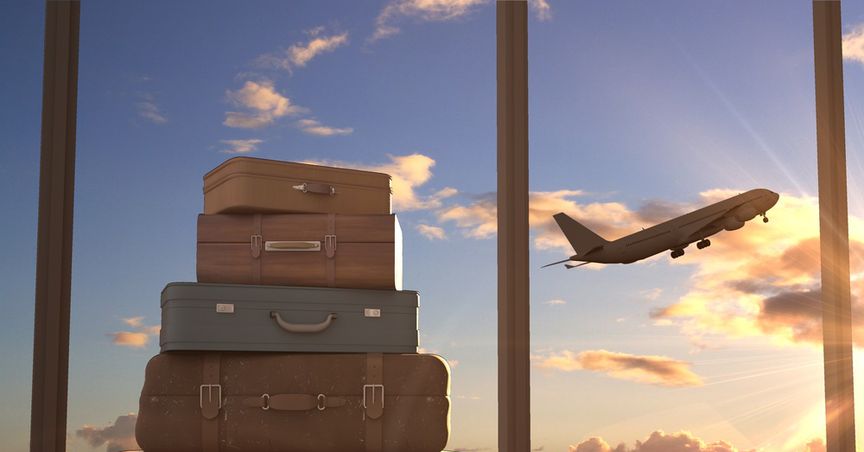Summary
- According to the World Travel & Tourism Council (WTTC), Britain could lose £22 billion as travelers and tourists are staying away from the country.
- The growing uncertainty around travel restrictions to curb the spread of COVID-19 infections during the pandemic in the UK has kept the tourists and visitors not to choose the country’s hotspots.
- In 2020, international visitor spending could drop by 78 per cent as compared to 2019.
- Since the outbreak of the coronavirus pandemic, almost 39,000 jobs have already been either lost or risked and could rise to affect 90,000 people if supply chains are also considered.
The travel and tourism industry has been one of the hardest hit due to the coronavirus-led economic crisis. Despite lifting the restrictions on traveling, recent spike in infections, social distancing norms, and quarantine rules have left the sector’s businesses financially strained, leading to huge job losses. According to the World Travel & Tourism Council (WTTC), the trade association representing travel and tourism sector globally, Britain could lose £22 billion as travelers and tourists are staying away from the country. The growing uncertainty around travel restrictions to curb the spread of COVID-19 infections during the pandemic in the UK has kept the tourists and visitors not to choose the country’s hotspots. London is considered to be one of the world’s most popular cities for international visits and the loss of global visitor spending would not only have a deeper but long-term impact on the economy for some years to come.

As per the WTTC’s 2020 Economic Impact Report, travel and tourism sector created around four million jobs in the UK during 2019. This number of jobs was equivalent to 11 per cent of Britain’s total workforce. The business activity in the sector generated approximately £200 billion in gross domestic product (GDP) or 9 per cent to the country’s economic output. The WTTC highlighted that the huge numbers reflect the sufferings of the workers and their families and the recovery process could take years. The position that London enjoyed as one of the prime destination for both business and leisure travel could be replaced by other global cities.
Also read: Two Travel & Leisure Stocks Trending on LSE – Carnival Plc & PPHE Hotel Group Ltd
Also read: Leaf Through Three Key Factors Defining Travel Space Recovery Scenario
Also read: STA Travel Becomes Another Victim of Corona Crisis; An Insight on TUI AG and Carnival PLC

A well-designed and monitored test & trace system would rebuild traveler’s confidence, besides permitting restitution of crucial air corridors between countries and regions having similar rates of COVID-19 infections. Effective measures are needed to restart safe travel between the UK and other major global destinations.
To help the global economic recovery, it is crucial to begin business-class trips between the world’s top financial centres like London and New York, among others. The travel and tourism sector would get a boost by restarting transatlantic journeys for business and leisure. This requires immediate attention on having a result-oriented global coordination and would benefit the entire supply chain such as airlines, hotels, travel agents, and tour operators, besides protecting and reviving millions of jobs that are dependent on it.
ABTA calls for customised measures to save jobs
The report by WTTC follows another industry report by ABTA (Association of British Travel Agents) with more than 4,300 travel brands as members and providing a wide range of leisure and business travel services, that called on the UK government to save jobs in the sector. The association that came out with its report a couple of days back, revealed that almost 39,000 jobs have already been either lost or risked across the outbound travel sector since the coronavirus crisis began. ABTA estimated that the number of affected workers could mount up to 90,000, if supply chains are also taken into account.
Also read: Fear of Second Wave Impact European Travel, Spain Faces the Wrath
Also read: Changing Landscape of Travel and Related Businesses
Also read: UK Insurers To See A Surge In Travel Insurance Policy Demand Post 31 Dec 2020
ABTA has sent a communication to the Chancellor of the Exchequer asking customised assistance in the form of a package of measures to support businesses and employees. The association has pointed out that nine out of ten businesses in the UK travel agency sector availed the benefits of the government’s Coronavirus Job Retention Scheme to support their employees. Despite the support, 65 per cent of the companies were compelled to announce redundancies or have commenced discussing with their staff. Given the faith shown by four in ten firms that the sector could revive itself to 2019 levels by 2022, the government needs to provide necessary support, said ABTA. Among other measures, ABTA focused on the quarantine measures and suggested region- specific quarantine norms. Bringing attention to the travel advice and quarantine rules by the Foreign Office, ABTA felt that it would be difficult for the UK to lift travel restrictions to important trade partnering countries such as the US.
To protect the jobs in the industry, the travelers need to be incentivised to book holidays. To make use of the peak booking season that would begin from December 2020, ABTA requested the government to announce an air passenger duty (APD) holiday from its autumn budget to cover summer season of 2021. The association feared that in the absence of any such measures, around 83 per cent of the firms in the sector are estimated to get severely impacted.
Conclusion
During the coronavirus pandemic, it cannot be denied that public health has been the priority for every country. But the travel and tourism industry that has suffered massively due to the crisis is expected to bounce back after many other industries. Many experts highlight that the measures to control the pandemic have impacted the revival prospects. Industry estimates showed that only 65 per cent of businesses have started operating. Amid the fears of a second wave of infections that could possibly lead to further shutdowns, it is expected that 96 per cent of travel businesses would be facing an adverse situation on their survival. While the government support could come a long way for the industry, it is additionally important to deliberate on the disaster and pandemic planning in such a way that not only revives the sector but also brings in sustainability. The industry needs to invest in latest technologies to provide a safe journey and create demand, thereby avoiding job losses.





